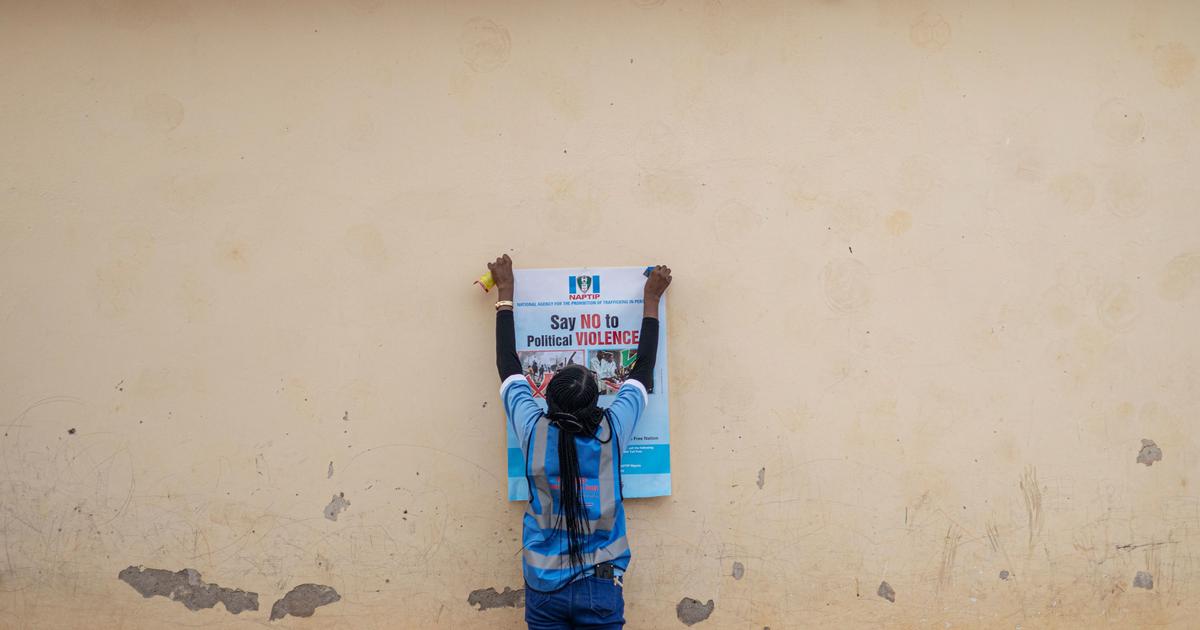Nigerians go to the polls on Saturday to elect, in a ballot with an uncertain outcome, the next president of Africa's most populous country, which is sinking into a serious economic and security crisis.
At the age of 80, President Muhammadu Buhari is stepping down as required by the Constitution after two terms marked by an explosion of insecurity and poverty in this country where 60% of the population is under 25 years old.
Read alsoAfrican Union observation mission for the upcoming elections in Nigeria
For the first time since the return to democracy in 1999, Nigeria could experience a two-round presidential election as the popularity of a former governor shakes up the predominance of the two main parties.
More than 87 million voters are called in 176,000 polling stations to choose a president from 18 candidates, as well as deputies and senators.
About 6 million voters, out of 93 million registered voters, have not withdrawn their electoral card and will therefore not be able to vote.
Polling stations must open between 8:30 a.m. and 2:30 p.m. but voters in line at this deadline will be allowed to drop their ballot into the ballot box.
This election is a crucial meeting.
Nigeria - 216 million inhabitants - should become the third most populous country in the world by 2050, while West Africa is threatened by a strong democratic decline and the spread of jihadist violence.
The continent's leading economy has become a global cultural power, thanks in particular to Afrobeats, a musical genre that is setting the planet on fire with stars like Burna Boy and Wizkid.
But the future president will inherit above all a myriad of problems: criminal and jihadist violence in the north and center, separatist unrest in the southeast, galloping inflation, generalized impoverishment.
To make matters worse, recent shortages of gasoline and banknotes have sparked riots.
"
Need for change
"
"
We have no fuel, no food, everyone is suffering
", lamented on the eve of the election a resident of Lagos, Abdulahi Audu, 31, who will vote because "
the country needs change
".
A promise brandished by the three favorites, including Bola Tinubu, 70, candidate of the ruling party (APC).
Ex-governor of Lagos (1999-2007), nicknamed the "
godfather
" because of his political influence, this Yoruba from the south-west and of the Muslim faith claims to be the only one who can turn Nigeria around.
He was accused of corruption and denied, as was Atiku Abubakar, another candidate from the main opposition party (the PDP, in power from 1999 to 2015).
At 76, this former vice-president (1999-2007) of the Muslim faith will run for the presidency for the sixth time.
Originally from the north, he hopes to win many votes there.
The ethnic and religious vote is important in Nigeria, which has more than 250 ethnic groups and is polarized between a predominantly Muslim north and a predominantly Christian south.
Faced with these two veterans, a credible challenger has emerged: the former governor of Anambra (south-east) Peter Obi, a 61-year-old Christian, supported by the small Labor Party (LP).
He particularly appeals to the youth and voters of his region.
The campaign was marked by attacks targeting local candidates, activists, police stations and election commission offices.
"
The risk of violence is a real concern
," said Sa'eed Husaini of the Center for Democracy and Development (CDD).
The identification of voters by facial and digital recognition should limit the fraud that has marred previous elections, hopes the Electoral Commission.
Just like the electronic transfer of results.
But the use of new technologies, unprecedented on a national scale, also raises fears of failures.
Generalized insecurity "
could disrupt the vote
", also worries the International Crisis Group (ICG) think tank.
Nearly 400,000 members of the security forces have been deployed.
Participation, low in previous elections (33% in 2019) is another unknown.
A spike in new registered voters (10 million, 76% of whom are under 34) can change the situation.
The results must be announced within 14 days of the ballot.

